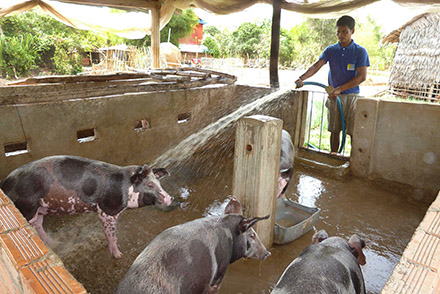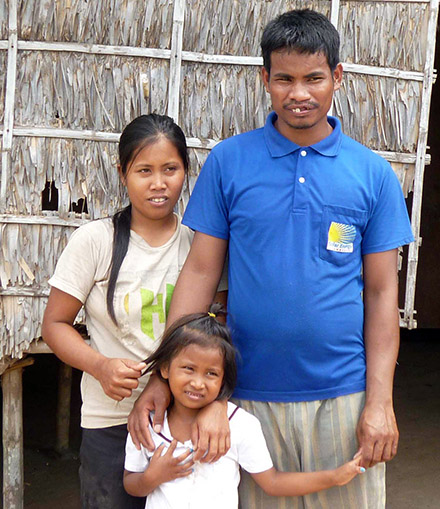At 28 years old, Ou Savankongkea and her husband Leuk Bunthoeun have two children and live in Svay Thom Village, Svay Rompear Commune of Svay Teap District, Svay Rieng Province, Cambodia. A lot has changed for their family since joining Heifer’s Improving Income and Nutrition through Community Empowerment (INCOME) project in 2012.
“Before joining the project, I worked as garment worker in Bavet near the Vietnam border,” Ou Savankongkea said. “My husband was a laborer and had a lot of free time, so he often went out to drink alcohol with his friends. He did not help with the housework. My children got sick often, but we had no other source of income.”

When Ou could not save money from her work, she decided to change her family’s course.
“Then our living depended on growing vegetables and rice, but we failed because we did not have the skills for preparing the soil to get the best yield. My family was in an economic crisis, and I had no confidence, resilience or self-esteem, nor a vision and plan for my family.”
When Heifer and its partner SANTI SENA Organization (SSO) started working in her village, they encouraged Ou to join a self-help group (SHG). At the first meeting, she hesitated to participate in the group, because she was not clear about purpose of SHG. However, she decided to join with the 25 members. They all knew this project was very important to help them create capital from group savings, allowed them learn and share knowledge and skills with each other.
The group started saving 10,000 Riel (about $2.50) each month, and they set up group regulations, structures and a development plan. The group received capacity building on Heifer’s 12 Cornerstones for Just and Sustainable Development, animal management, microfinance management, integrated farming systems and swine raising management.
Help a SHG save for sustainable change in their community.

“I was very interested in how to build an integrated farming system, so I borrowed 200,000 Riel (about s $50) from my SHG to buy some seeds, fish fingerlings, and chickens to accompany the swine my family received from Heifer,” Ou said. “I practiced the skills I learned to grow vegetables (cabbage and green onion) and fish, and I raised 15 chickens and five fattening pigs year round on small plot, using the water we collected from canal nearby during rainy season to keep it for use for vegetable and animal raising during the dry season.”
Ou smiled and said, “I am so happy with my vegetables, fish, chickens and pigs, because I have been able to sell them in the village and local markets. I earn 800,000 Riel (about $200) from vegetable selling each month and 600,000 Riel ($150) from selling pigs each five months. My family has decreased expenses on food, and we are self-employed at home. I am able to feed my children with this income, and my husband helps me to do housework—cooking, bathing children, washing clothes, watering and weeding garden, as well as tending to the animals.”
Since her family stopped buying vegetables produced with chemicals outside and started boiling their own drinking water and practicing good personal hygiene, their children have grown healthier.
Furthermore, Ou has already passed on three piglets, vegetable seeds and shared practical experience of the integrated farming system with her fellow group members.
“My family's living conditions have significantly improved compared with before,” Ou said. “In the future, I plan for my children to finish high school, to increase the number of livestock we raise and to grow more vegetables.”
Svay Thom Village Chief Keo Sameun said, “On behalf of the local authority, I am very proud of Mrs. Ou Sovankongkea. She is a good role model in the village. Her family does not have any domestic violence; she has a very good relationship with her neighbors, and she helps and cares for others. She tries to improve her skills by learning new things from others and practicing what she learns to make money. Also, she has shared the successful experience of seasonal vegetable growing, pigs and chicken raising techniques with others.”
Similarly, Ou’s SHG leader Nhem Vanna said, “She works hard to improve her living standard; she has a very good attitude and has earned the love and respect from other people. Today, she is not only a good model farmer, but she is also a good savings member and good SHG cashier whom all the members trust because she is honest, keeps good records of saving documents and takes care of Heifer’s gifts.”
SHG member Hin Sophon added, “Mrs. Ou is good model in the village whom I follow and have learned from—especially her successes with the green organic vegetables growing around her home.”
Ou said she is grateful to Heifer International and SSO for their support in the development of her family and the community through the SHG.
Story by Pheung Phasith, Program Officer, Heifer Cambodia
Photos by Lay Samphors, Project Coordinator, SANTI SENA Organization